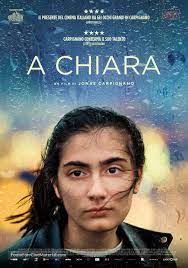A CHIARA/ TO CHIARA
Italy, 2021, 121 minutes, Colour.
Swamy Rotolo and members of the Rotolo family, Fumo family.
Directed by Jonas Carpignano
 This is a rather different Mafia story, a focus on a family in southern Italy, and especially on Chiara, 15 years of age. The setting is very local, a small town away from Reggio Calabria, the ordinariness of life in the town, family and friends, connections, school, and birthday celebrations.
This is a rather different Mafia story, a focus on a family in southern Italy, and especially on Chiara, 15 years of age. The setting is very local, a small town away from Reggio Calabria, the ordinariness of life in the town, family and friends, connections, school, and birthday celebrations.
There are some family resemblances in the cast – and we discover that most of the performers are amateurs but the central characters all belong to the same family.
A word of warning for prospective audiences: just as when there are flashing lights, strobe lights, a warning is often given that this may have an effect on the audience watching. For almost 20 years, especially with some small-budget local horror films, the use of the handheld camera has become very popular. Here it is used throughout the film, the audience very conscious of the handheld effect of the camera, the continued movement, jerky and unpredictable, from one character to another, a great number of close-ups, extreme close-ups. It may mean that an audience can be more focused on the technique of the handheld camera,, physically and psychologically, than becoming involved in the narrative and the characters.
One blogger noted, aptly: I didn't like the handheld shaky cam cinematography. I thought it was inappropriate for the story and made it difficult to get perspective on the settings.
The audience is immersed, involved because of the handheld camera, in the life of the family in a small town, quiet father, household-busy mother, sister turning 18, and a little girl, boisterous and irritating, but a strongly bonded family. Then about 20 minutes is given over to the sister, Giulia, and her 18th birthday party. We live the life of the family – a little puzzled because the father, reticent, draws back from toasting his daughter.
Then a huge transition. The father’s car is blown up in the street. He disappears. And the drama for Chiara is that she learns about what has happened, his Mafia background, from social media. Her mother is not forthcoming. Giulia does not wish to explain.
There are further repercussions for Chiara, social services coming to visit the school and her family, the proposal that she be fostered out because of the trouble – and, it emerges, that many of the relatives and connections in the town are also involved.
There is a sequence which brings home to the audience some of the detail, small details, of Mafia activity. Chiara seeks out her father, finds him hiding in an underground bunker, equipped with considerable surveillance techniques. But, he invites her to accompany him on the process of making the contacts, collecting the drugs, the payments for the drugs, the processing of the drugs, the new packaging, the distribution and repackaging, the profits.
One thought is that after this explanation to Chiara and her experience, and her previous devotion to her father, it might mean that Chiara herself will take on the family tradition of Mafia and drug dealing.
The ending is upbeat, more positive, a different celebration as Chiara turns 18.
- The title, the role of Chiara? The literal meaning, too? The meaning also of how this pertains to Chiara?
- The cast generally as amateurs, the members of the one family, their working together?
- The setting, southern Italy, the town, school, the seaside, homes, underground bunkers, the beach? The contrast with Urbino? The finale and society? The musical score, local music?
- The style, handheld camera, continued movement, the effect on the audience, close-ups, extreme close-ups – and sometimes a relief in a widescreen scene? The cumulative effect of this style, especially during the birthday party?
- The introduction to Chiara, her story, age 15, at the gym, coming home, the cosiness of the family, the mother working, the father rather more restrained, Giulia turning 18, Georgia and her mischievous behaviour, rowdy and irritating?
- The party, Giulia at 18, long sequence, the detail of the party, the guests and their relationships, talking and laughing, the music, the food, each member of the family, the urging of the father to make a toast, his reticence, the other members of the family?
- The aftermath, the bombing of the car, the father disappearing? Chiara learning the news about his Mafia connections from social media? The effect on her, her talking with her friend, at school, asking her mother for the truth, the mother’s reticence, asking Giulia, her not wanting to explain? The change in Georgia, now a quiet and moody?
- The background of Mafia dealings in southern Italy, the locals, drug deals, the capos and their authority, murders? Chiara and her discovery of the underground bunker in the home? The later discovery of her father’s bunker, going to see him, Antonio and the driving, the father taking Chiara with him, the meetings, the drugs, the treatment of the drugs, the repackaging, the distribution…?
- Chiara, her behaviour, social services coming, at school, the interview at home, the prospect of her being fostered out? Her running away, the contacts with her cousin, the visit to the bunker? Its effect on her?
- The passing of time, her 18th birthday, not with her family, the new family, friends, prospects, the celebration, at the sea with her friends, the drinking, the drugs, her finding a place?